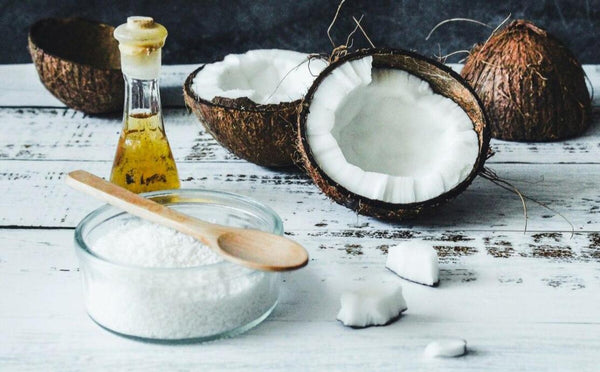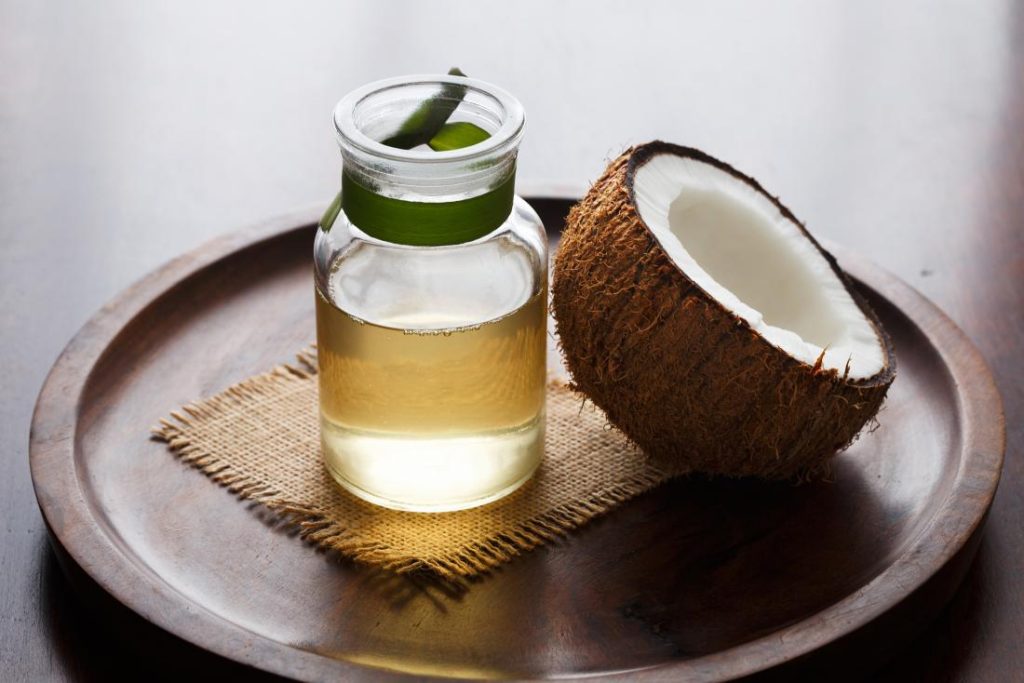Coconut oil has gained immense popularity in recent years as a versatile and beneficial oil for both culinary and health purposes. Extracted from the meat of mature coconuts, coconut oil is rich in saturated fats, particularly medium-chain triglycerides (MCTs), which offer a variety of health benefits. This article explores the numerous advantages of coconut oil, its nutritional profile, and how to incorporate it into your daily routine.
Nutritional Profile of Coconut Oil

Coconut oil is predominantly composed of saturated fats, making it unique compared to other cooking oils. Here’s a breakdown of its composition per tablespoon (about 14 grams):
- Calories: 120
- Total Fat: 14 grams
- Saturated Fat: 12 grams
- Monounsaturated Fat: 0.8 grams
- Polyunsaturated Fat: 0.2 grams
- Carbohydrates: 0 grams
- Protein: 0 grams
Key Components
- Medium-Chain Triglycerides (MCTs): Coconut oil is rich in MCTs, which are easily absorbed and metabolized by the body, providing quick energy.
- Lauric Acid: Approximately 50% of the fatty acids in coconut oil are lauric acid, known for its antimicrobial properties.
Health Benefits of Coconut Oil
1. Boosts Heart Health
While coconut oil is high in saturated fat, studies suggest that it may improve heart health by:
- Increasing HDL Cholesterol: Coconut oil can raise levels of high-density lipoprotein (HDL) cholesterol, often referred to as “good” cholesterol, which helps reduce the risk of heart disease.
- Improving Lipid Profiles: Some research indicates that coconut oil may help lower triglycerides and improve overall lipid profiles.
2. Supports Weight Loss
Coconut oil may aid in weight management due to its unique composition:
- Increased Energy Expenditure: MCTs in coconut oil can boost metabolism, leading to increased calorie burning.
- Reduced Appetite: Consuming coconut oil may help reduce hunger, which can lead to lower calorie intake overall.
3. Enhances Brain Function
The MCTs in coconut oil provide a quick source of energy for the brain, which can be particularly beneficial for cognitive function:
- Potential Neuroprotective Effects: Some studies suggest that MCTs may help in managing conditions like Alzheimer’s disease by providing an alternative energy source for brain cells.
- Improved Mental Clarity: Users of coconut oil often report enhanced focus and clarity, likely due to its rapid conversion to ketones, an efficient fuel source for the brain.
4. Antimicrobial Properties
Coconut oil has natural antimicrobial properties, thanks to lauric acid and other fatty acids:
- Fighting Infections: Lauric acid can help combat harmful bacteria, viruses, and fungi, making coconut oil a useful addition to your diet for immune support.
- Skin Health: When applied topically, coconut oil can help prevent infections and promote healing due to its antimicrobial effects.
5. Supports Skin and Hair Health
Coconut oil is widely used in skincare and haircare for its moisturizing properties:
- Moisturizer: It effectively hydrates the skin and can be used as a natural moisturizer for dry skin.
- Hair Conditioner: Coconut oil can improve hair health by reducing protein loss, enhancing shine, and preventing damage.
6. Aids Digestion
Coconut oil may promote digestive health by:
- Supporting Gut Health: Its antimicrobial properties can help maintain a healthy balance of gut bacteria, reducing the risk of gastrointestinal infections.
- Improving Nutrient Absorption: The fatty acids in coconut oil can enhance the absorption of fat-soluble vitamins (A, D, E, and K) and other nutrients.
7. May Help Regulate Blood Sugar Levels
Some studies suggest that coconut oil could have a positive impact on blood sugar levels:
- Improved Insulin Sensitivity: Regular consumption of coconut oil may enhance insulin sensitivity, which is beneficial for blood sugar control.
- Reduced Risk of Type 2 Diabetes: By supporting healthy blood sugar levels, coconut oil may help lower the risk of developing type 2 diabetes.
How to Incorporate Coconut Oil into Your Diet
1. Cooking and Baking
Coconut oil is a versatile cooking oil that can be used in various ways:
- Sautéing and Stir-Frying: Use coconut oil for sautéing vegetables or stir-frying meats for added flavor and health benefits.
- Baking: Substitute coconut oil for butter or other oils in baking recipes for a tropical twist.
2. Smoothies and Beverages
Add a tablespoon of coconut oil to smoothies or coffee for a creamy texture and an energy boost.
3. Salad Dressings
Mix coconut oil with vinegar, lemon juice, and herbs to create a delicious salad dressing.
4. Topical Use
Apply coconut oil directly to the skin as a moisturizer or use it as a hair conditioner. It can also be used as a natural makeup remover.
Potential Risks and Considerations
While coconut oil has many health benefits, it’s important to consider the following:
1. High in Calories
Coconut oil is calorie-dense, so moderation is key to avoid excessive calorie intake that can lead to weight gain.
2. Saturated Fat Content
Although coconut oil can raise HDL cholesterol, it is still high in saturated fat. Individuals with specific health conditions, such as heart disease, should consult a healthcare professional before incorporating it into their diet knowledge.
3. Allergies
Some individuals may have allergies or sensitivities to coconut. It’s essential to monitor for any adverse reactions when using coconut oil for the first time.
Conclusion
Coconut oil is a multifaceted oil that offers a range of health benefits, from supporting heart health and brain function to enhancing skin and hair health. Its unique composition of medium-chain triglycerides and lauric acid makes it a valuable addition to a balanced diet. By incorporating coconut oil into your cooking and daily routine, you can enjoy its numerous benefits while savoring its delicious flavor. As with any dietary change, moderation is essential, and consulting with a healthcare provider can help ensure that coconut oil fits well into your overall health plan. Embrace the benefits of coconut oil and discover how it can enhance your well-being!
Read Also About Whole grains are an essential part of a healthy diet, offering a wealth of nutrients that are often lost in refined grains. Unlike their processed counterparts, whole grains contain the entire grain kernel, including the bran, germ, and endosperm, which provide fiber, vitamins, minerals, and antioxidants

